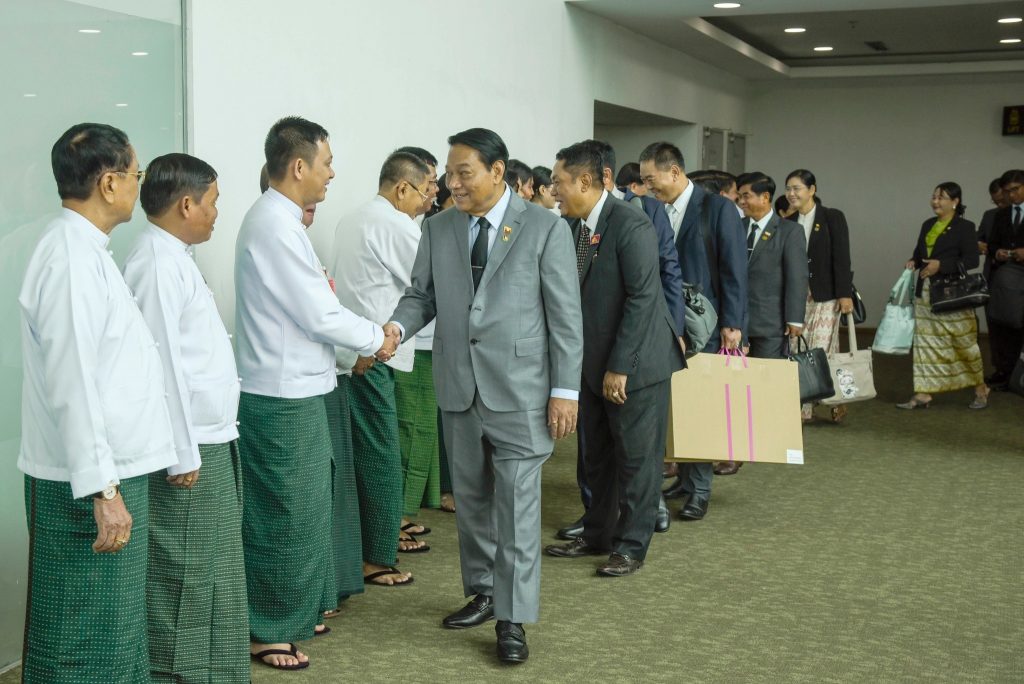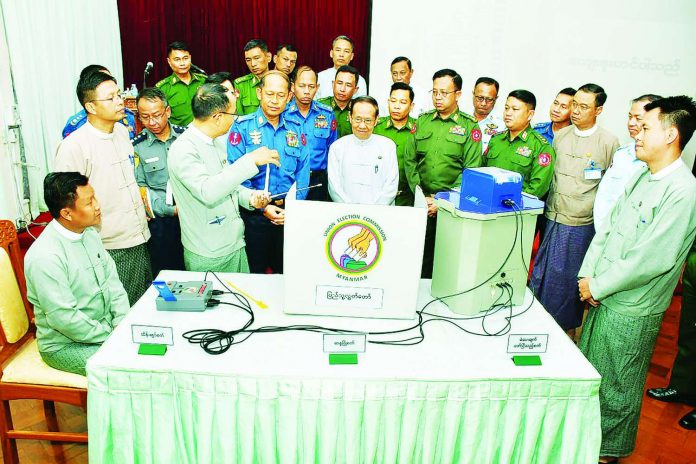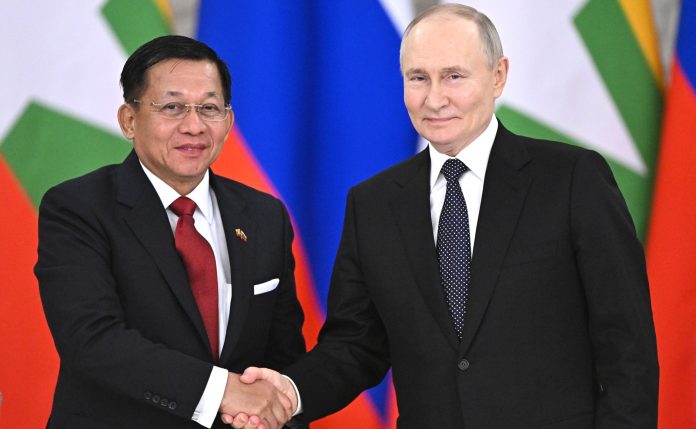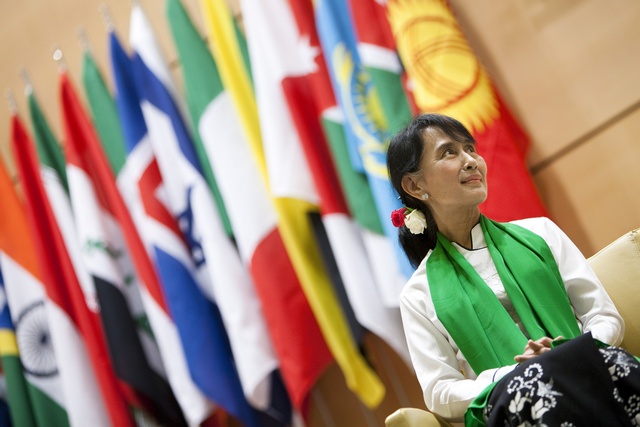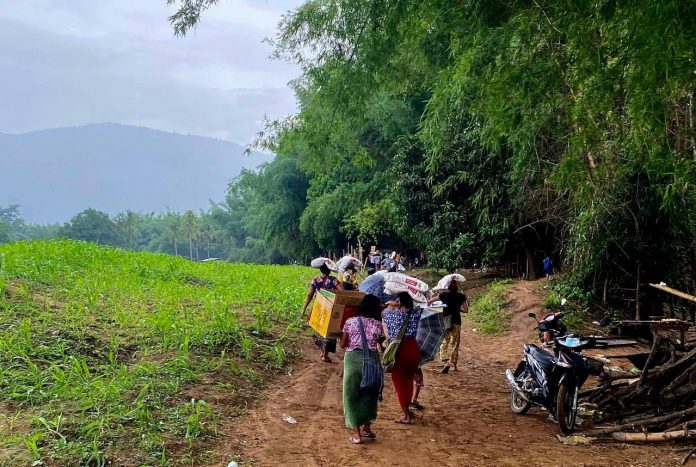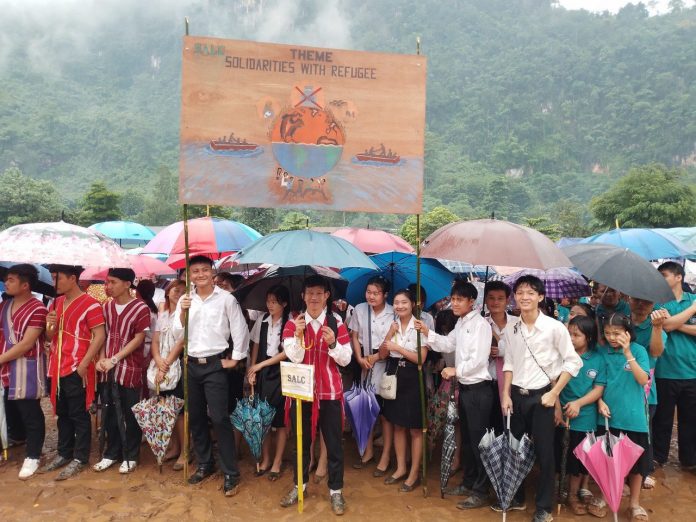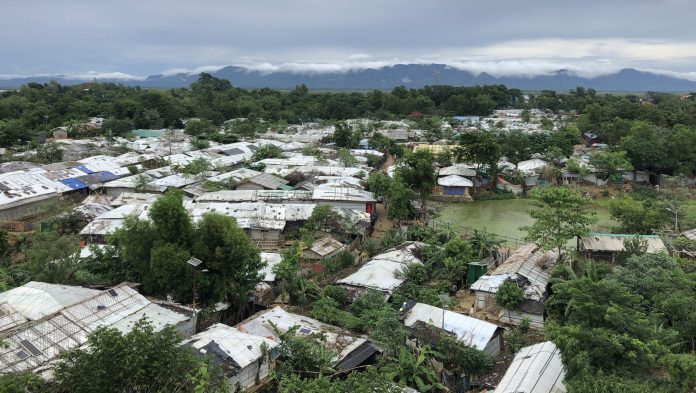Phil Thornton for DVB
Since late May, the Karen National Liberation Army (KNLA) and its allied People’s Defence Force (PDF) have attacked military bases along the Myanmar-Thailand border in an attempt to consolidate its control over major trade and transport routes into and out of the country.
A senior KNLA official confirmed that after weeks of fierce fighting the Karen resistance forces were now in charge of a number of the most important military bases along the border.
This includes Thay Baw Boe, a former Karen National Union (KNU) camp contested by the military, which seized it from the KNU in 1995 but had it retaken in 2022 before being seized again by the military later the same year.
Thay Baw Boe is once again under KNU control. It is located 111 miles (180 km) from the Karen State capital Hpa-An and 32 miles (52 km) from the vital border trade town of Myawaddy.
Resistance forces under KNLA command now have their sights set on the military’s nearby Walay strategy base with around 400 troops inside, and the smaller but important army camp at Oo Kray Hta.
If and when the KNLA and its allies capture both camps, it will give the combined resistance forces control of most of the border’s transport routes and its lucrative trade gates. Without the protection of both camps, the military’s control over Myawaddy is left vulnerable to the resistance.
The intense fighting was added to by the Myanmar Air Force’s air support – jets, helicopter gunships, Y-12 transport planes and suicide drones. It’s been well documented by international sources that airstrikes on resistance forces target civilian communities in retaliation for what the military claims is civilian support for the resistance.
As is its long-term practice, the KNLA-led forces warn and help villagers to take refuge in the nearby jungles and mountains, well away from the fighting and airstrikes ordered by Naypyidaw.
The repeated defeat of Myanmar’s military has somewhat lessened the villager’s fear of retribution from its troops, but it’s the indiscriminate airstrikes on unprotected civilian populations that they dread.
Villagers from Kwee Ler Shu and Taw Oh Hta, despite being well away from the frontline fighting at Thay Baw Boe, said the regular sound of fighter jets, helicopters and Y-12 planes circling overhead was a constant threat.
“The pilots know what they’re doing – it’s deliberate – they bomb villages,” said Kyaw La Her, a corn farmer from Kwee Ler Shu.
Thay Baw Boe, opposite Thailand’s Phop Phra District, is wedged on the Moei (Thaungyin) River that separates the neighbouring countries. To get to Kwee Ler Shu village is a hard drive over the Dawna Ranges and if flooding permits, crossing the Megale River.
Residents confirmed that as many as 10 bombs were dropped on their village, including cluster bombs, on May 29. They are now gathered in a number of safe houses near Thailand’s riverine border.
“The bomb hit the top of the big tree. We were just running when I was knocked over. At first I didn’t feel anything. My friends couldn’t look at my wounds, there was so much blood. I was scared it was going to be really bad. The doctor said I was lucky. The shrapnel didn’t hit any bones or arteries,” said K’Lu Htoo, age 15. “I feel it now – it’s painful.”
K’Lu Htoo, mindful of the pain, is slow to move his bandaged leg as he manoeuvres himself into a sitting position. He and his friends were eating when bombs landed on their village. “There were just four of us. We heard the plane and ran for cover, but the bomb exploded,” he added.
The boy’s dorm was around 30 metres from a snack shop, and both it and a big tree were destroyed by the explosion. Three out of the four students were hit by shrapnel.
Despite being hours from the frontline, villagers pointed out planes and helicopters had been circling overhead in the area while intense fighting continued at the military’s Thay Baw Boe base.
Monsoon rain beats down on the metal roofing silencing talk. The three injured boys, wounds bandaged, sit waiting for a doctor to assess their injuries. “There were four loud explosions, and I think another six bombs didn’t explode,” said Kyaw La Her, the corn farmer.
The village teacher, Saw Khu Gay, was also hit by shrapnel while running from the bombing. “Nine cluster bombs exploded – two hit villager’s houses, one the school, a shop, one the girl’s dorm and one the boy’s dorm. It’s hard to find words to explain how helpless you feel. Worried, scared, anxiety, fear. I was concerned for the children, but I ran.”
Despite the terror the fighter jets delivered to the villagers, Saw Khu Gay like many of the villagers, insist his loyalty to the anti-2021 coup resistance remains strong. “We know they’re fighting for our freedom and we know why they’re fighting. We’re teachers and we know we are all fighting for the future of our students and our people.”
The Armed Conflict Location & Event Data (ACLED) reported that the “The [Myanmar] military has increased its use of remote violence, such as air and drone strikes and shelling, to target broader populations as it loses ground to resistance groups. In 2023, there were 253 military airstrike events targeting civilians, which more than tripled to 776 strike events in 2024 — the equivalent of more than two per day.”
The U.K. based Action on Armed Violence (AOAV) confirms the rising number of airstrikes carried out in Myanmar. “Between 2021 and 2024, the military junta has intensified its air strikes across the country, for example, the number of airstrikes increased by 2,563%, from 8 to 213 between 2021 to 2024. The number of civilian casualties as a result has increased by 3,145%, from 62 to 2,012 between the same time period.”
The National Unity Government (NUG) and the Global Coalition to Protect Education from Attack (GCPEA) estimates that from the day of the coup on Feb. 1, 2021 up to May 12, 2025, the military has targeted and bombed 333 schools.
The military spokesperson Zaw Min Tun gave a blunt assessment when asked by a reporter from Al Jazeera about the massacre of children at Pazigyi village, Sagaing Region, on April 11, 2023.
“In attacks collateral damage is unavoidable… collateral damage happens,” he said from the military’s purpose-built capital in Naypyidaw. Over 155 people were killed at Pazigyi, many of them children. Pazigyi is located 267 miles (429 km) north of Naypyidaw
The U.N. Independent Investigative Mechanism for Myanmar (IIMM) released a statement in April that noted the Pazigyi massacre remains the deadliest single attack in over four years of armed resistance to the 2021 coup.
“Civilians are not just indirect victims of these attacks but often appear to be the targets. Schools, homes, hospitals, clinics, displaced persons’ camps, churches, monasteries and public gatherings such as concerts have been bombed,” said Nicholas Koumjian, the head officer with the IIMM.
Across the river that separates Thailand from Myanmar, 28 ramshackle huts have been built to house families displaced by the airstrikes earlier this month.
Naw Naw Hser Khu Paw, age 49, was forced to move to the relative safety of the border after her village, K’Nae Lay, was bombarded by artillery.
“They have taken away our schools, livelihoods, plantations, peace of mind and we’ve had to put our future on hold. We need rice, it’s our staple. If the junta left us alone, we could manage our farms and plantations.”
She adds that despite not having enough food to feed themselves, she is more than happy to share what she has with the resistance forces. “The soldiers cannot cook at the frontline. We are happy to share.”
Kyaw La Her, the corn farmer from Kwee Ler Shu, thanked the young men and women in the resistance forces for their sacrifice.
“I’m proud of the young Karen soldiers – not only the Karen – but all the PDF resisting the madness of the junta. When we hear a junta camp has been captured, we’re overjoyed. I can say we celebrate, even the old women take to dancing. But we know we will have to run again, because the planes will come.”
*Dr. Drit runs the KNLA Cobra Column frontline medical team, which treated Kwee Ler Shu’s injured and many of the other villagers caught in the airstrikes.
“The evidence is there – bombs dropped consistently on villages, schools, temples, hospitals. In May alone, we had 42 casualties– seven dead and 35 wounded. Mostly shrapnel from airstrikes – Y-12, jets, helicopters and drones. Seven of those casualties were villagers,” he said.
He explained he and his team are guided by his understanding of the Hippocratic oath and this is confirmed by his actions on the frontline. His combat medics attend to the wounded, including villagers, resistance forces, and even captured prisoners of war.
“Our unity and morale are easily explained by how successful our planned nationwide attacks have been,” added Dr. Drit.
The Karen National Union (KNU) spokesperson Padoh Saw Taw Nee reiterated that resistance forces are committed to the overthrow of the regime in Naypyidaw and establishing a federal democratic union with the Karen homeland “Kawthoolei” as a federal unit.
“We started the recent operations on April 14, our combined forces included PDF and the Mon Liberation Army (MLA). We’re now intent on clearing out all the [military] bases on the border.”
Padoh Saw Taw Nee added that ethnic armed groups have decades of experience fighting against the military and its attempts to destabilize their political and armed struggle.
“We’re all aware now. We’ve learnt from these divisions and how destructive they can be to our revolution. Before the 2021 coup it was hard to explain – the massaging of religious differences, stoking ethnic tensions, rewarding and bribing – but now it is crystal clear how the dictatorship operates. The people can now see how the regime operates. They’re like a cancer in the country that we need to get rid of.”
The U.N. High Commissioner for Refugees (UNHCR) estimates that over 3.5 million people are now Internally Displaced Persons (IDPs) in Myanmar.
“There are now over one million [civilians displaced] in Karen State alone. It’s a huge humanitarian problem – food, shelter, disrupted education, health – and it will get worse. Schools have had to close because of the constant airstrikes,” said Padoh Saw Taw Nee.
*We’re using this name to protect his identity.
Phil Thornton is a journalist who has reported on Myanmar for more than 20 years and is the author of the book Restless Souls: Rebels, Refugees, Medics, and Misfits on the Thai-Burma Border.
